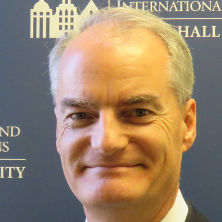
The geopolitics of sport are in the headlines as we approach the Beijing 2022 Games. This global event risks going down in history as the genocide Olympics.
There is widespread outrage against China’s exploitation of the Games for “ring washing”, that is, wearing the Olympic halo to blind the world from its human rights abuses at home and abroad.
Since Mao’s ping pong diplomacy, the Communist Party of China (CPC) over time has culturally appropriated western sport. Why? To build legitimacy and prestige at home and abroad – to beat us at our game and claim that authoritarianism delivers best.
China does not engage in sport for enjoyment or for people-to-people understanding, rather for this party propaganda. It participates, not in the spirit of fair play, but as a necessity for the highest medal count. This, the CPC tells itself, is how power is projected to the world.
Word to the wise: the rest of us need not indulge the CPC’s self-serving perceptions and its purposeful misread of the Olympic brand. We must flip the script while the cameras are rolling these next weeks.
The CPC should note that political opportunities carry risk to its narrative that authoritarianism delivers best. Sport and politics can intertwine like the laurel on victory wreaths. And if sport becomes “war minus the shooting” (George Orwell), the made-in-China Olympic moment is the first casualty.
The Olympics is the world’s largest movement, surpassing any single population, philosophy, or religion. Its rings command billions from sponsors and advertisers in the modern era. It started in 776BC through an Olympic Truce amidst warring Greek city states for safe passage and participation at games. The Truce remains the oldest international pact in existence and has become the most widely supported of all United Nations agreements.
Through the mists of time the Olympic torchlight now attracts billions to share in human excellence. Over the next weeks that light will intensify into sunshine on Chinese human brutalities which deny the very human virtues, such as fairplay, meant for display.
Already, several diplomatic boycotts by countries indicate an Olympic-sized blowup in the CPC’s face.
Further, imagine a “Beijing Jessie Owens” putting the lie to the host’s propaganda. Or visualize another Munich-like terror attack haunting the host China into the history books. And might Russia’s exploits in the Ukraine be timed to snatch away the CPC’s cherished media moment?
Such breaking news would overtake Beijing’s massive bought-and-paid-for ad for authoritarian governance.
But – what if everything runs as smoothly scripted and airbrushed as the 2008 Beijing Games?
China may host the Olympic Movement, but it cannot hijack the Olympic Ideal.
What is the Olympic Ideal exactly? It is to educate youth for a better and more peaceful world through sport. Curiously, the Olympic Ideal is not “about” sport, rather “through” sport, for a global ethos.
That Ideal has prevailed over thousands of years; it has survived the bumps and bruises of geopolitical eras, even the failings of the Olympic Movement itself from time to time. Among such epidodes are team boycotts, performance doping, and judges meddling in the medaling.
To reach the Olympic Ideal, the torch takes a long and twisting path. And now toward Beijing it is shedding its light. As it draws closer, it is enflaming global public to call out the CPC’s abuses against the human condition we are meant to celebrate.
So, let us not surrender the Games to the Chinese Communist Party’s manipulations. Let us save our scorn not for the event but for its unworthy host. Let’s flip the script these weeks, bring our best game to the table, forge solidarity with others, and create real consequences for Beijing’s inhumanities and ring washing.
Ultimately may the genocide Olympics be renamed by history as the “end-of-genocide Olympics”.
*Hugh Dugan recently served as senior director on the National Security Council. He revived the ancient Olympic Truce for the modern era while a US diplomat at the United Nations and then founded the Truce Foundation of the USA. The Olympics awarded him its Medaille Centenaire in 1994.